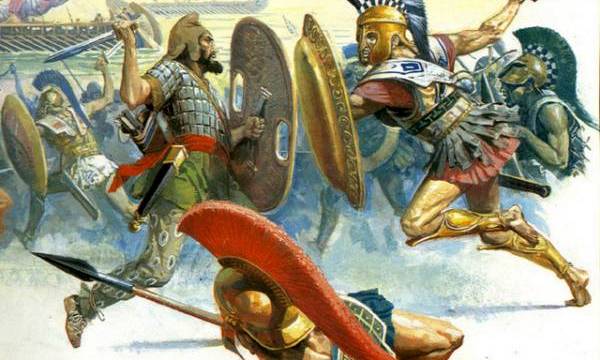Afghanistan: The lessons of history.

Men and women of the American armed forces are on patrol today in the ancient cities of Kabul, Herat, and throughout Afghanistan. Our soldiers come in the footsteps of so many other armies: the Immortals of the Persian King Cyrus, the Macedonian Phalanx of Alexander the Great, the armies of Islam, Genghis Kahn, and Tamerlane. They patrol where once came the thin red line of British soldiers and the vaunted Red army of the Soviet Union.
No army has ever come with better intentions than the Americans. When it began in 2001, in the aftermath of 9/11, Operation Enduring Freedom in Afghanistan was strategically essential. It was necessary for us to show Islamic terrorists that we would strike back with all our force. We also came with the good intention of making the life of the ordinary citizen of Afghanistan better. Ten years later, neither of these objectives has been fulfilled.
Why?
It is because we refuse to learn the lessons of history and apply them. We live in an ahistorical age. We write many books about history that become best-sellers. But we refuse to understand what the Founders of our country understood. Historical facts in themselves are good for nothing but trivial pursuit. We need to follow the Founders of our country and think historically. To think historically is to use the lessons of the past to make decisions in the present and plan for the future.
No other area of the world is so rich in the lessons of history than the Middle East, including Afghanistan.
Question 1: Why would anyone want to be in Afghanistan?
To paraphrase Winston Churchill on Bolshevik Russia: “Afghanistan is an unpleasant land, filled with unpleasant people, armed to the teeth, and eager to shoot any foreigner or anyone of themselves.”
However, since the 6th century BC, Persians and other foreigners have been attempting to conquer Afghanistan.
Lesson 1: Afghanistan is absolutely vital strategically to any empire that wishes to dominate the Middle East.
Part of its strategic value lies in its central position along the great trade route, which once brought silk and now brings opium. Afghanistan is strategically a dagger pointed at the heart of Iran, India, Russia and China. Today, as in the sixth-century BC, Afghanistan has been the traditional route of invasion into Pakistan and India.
Question 2: Can Afghanistan be conquered?
Lesson 2: Yes.
Afghanistan was conquered and ruled successfully by the Persian Empire from 539 until 331 BC. The Persians left a lasting impression. King Darius would still recognize the provinces of the Persian Empire in the provincial structure of Afghanistan today. Persian is still one of the two most widely spoken languages in Afghanistan, along with Pashtu, the language of the ethnic Afghans, and a close relative of the Persian language.
Alexander the Great conquered and ruled Iran with effects lasting for two centuries. Unlike the Persians, Alexander was not a near relative of the Afghans. Like the Americans, he came as a hated foreigner, regarded with contempt as unclean, an infidel. A recent distinguished American statesman said that all Alexander did was to pass through Afghanistan. The statesman was dead wrong in his knowledge of history. Alexander, from 330 until 327 BC, systematically conquered the country by the most ruthless exercise of military force. Then having conquered the Afghans, he won their hearts. Alexander married, as his first wife, Roxanne, the daughter of the Afghan warlord, Oxyartes. Alexander then conciliated all the other warlords of Afghanistan. His firstborn son and heir to his great empire would be an Afghan and Alexander made the Afghans full partners in his great new world. What Alexander did not try to do was to force Greek customs and Greek values, like democracy, upon the Afghans. He not only allowed them to keep their customs, he adopted the customs of the Afghans and the Persians. Alexander became a national hero to the Afghans, who still invoke with awe the name of Skander (Alexander).
Alexander died in 323, and his Afghan son did not live to inherit the promise of a world empire. But Alexander’s imprint upon Afghanistan remained for two centuries. From 330 BC until 150 BC, Afghanistan was part of a Macedonian-Greek- Afghan kingdom. The cultural values of Greece merged with those of Persia and the Afghans, to create a multi-cultural diverse state. The excavation of one of the cities founded by Alexander, now called Ai Khanum, in Afghanistan, shows the blending of Greek, Persian and Indian art and the mutual tolerance of Greek religion with Buddhism.
Thus Alexander shows the key to ruling Afghanistan: absolute military ruthlessness; allowing the Afghans to keep their own traditions; and then over a period of time allowing the culture of Afghan to meld with that of the conquerors.
Question 3: Why can we not repeat the success of Alexander the Great?
Lesson 3: America is never going to take such a path.
As we have shown in Korea, Vietnam, and more recently in Iraq, America—and this is a good thing—will not use absolute military force. We fight a war with as much concern for the life of the enemy civilian as we do for the lives of our own troops. The rules of engagement that we have now in Afghanistan would simply have astounded Alexander the Great. In fact, he would have simply told us, “Nuke ‘em.”
Secondly, from the outset, we have wanted to establish a democracy in Afghanistan. American democracy is not a universal value. The Afghans do not want our democracy; they do not want our culture, which they see as filled with pornography and the refutation of all their religious and cultural values.
Question 4: The Soviets were as ruthless as Alexander. Why did they fail to pacify Afghanistan?
Lesson 4: We have refused to learn from the failed Soviet attempt to conquer Afghanistan.
We should have taken its lessons deeply to heart, because we made excellent use of traditional Afghan values to defeat the Soviet Union. The Soviet army certainly had no rules of engagement except to kill. Alexander the Great, indeed Genghis Khan, would have approved fully of the savagery of the Soviet soldiers and high command. But the Soviets failed because they attempted to impose, like us, an alien political and cultural system upon the Afghans. The Soviets sought to create a communist state in Afghanistan, with officially sponsored atheism, the education of women, and the rejection of traditional Islamic life. That is why the Soviets failed. The lesson of history is that neither American- style democracy nor Soviet- style Communism will win the hearts of the Afghans.
Question 5: What should we do in Afghanistan?
Lesson 5: Adapt the wisdom of history to our realistic goals in Afghanistan.
We cannot simply leave. The failure of the United States to carry through once it has begun a military intervention can be catastrophic in both the short and the long term. This is the lesson of Korea, Vietnam, and the Iranian hostage fiasco. We cannot afford to give the Islamic world another example of weakness.
We must adapt our strategy to the lessons of history in the Middle East. Freedom is not a universal value. Throughout its history, the Middle East has chosen despotism over freedom. The Greek historian Herodotus wrote the history of the epic victory of the free Greeks over the slaves of the Persian despot in 490-479 BC. To Herodotus, “the father of history,” this was the eternal theme of history: the freedom of Europe against the despotism of the Middle East. The ancient Persians, like the modern Afghans, did not want democratic freedom. Like the ancient Persians, the Afghans want a strong, just authoritarian ruler, who will maintain Afghan traditions and give to every element in society it appropriate rewards. The division of the country into powerful warlords is fundamental to this system. So is bribery and corruption, as Alexander understood.
The British understood this lesson as well. Afghanistan was vital to the security of British India. An attempt at military subjugation by the British ended in humiliating defeat in 1839-42. Britain then turned to a policy of supporting a strong king of the Afghans and bribing him with enormous sums of gold to adhere to British foreign policy. For almost a century, down to the independence of India in 1947, the system worked well enough to secure British interests and to foil plots by Russians and Germans to subvert the Raj.
America’s goal is not the conquest of Afghanistan. Our priority is to ensure our own security by stabilizing Afghanistan and eradicating the poverty and xenophobia that make it a breeding ground for terrorists. The raw materials are there to establish a reasonably prosperous and stable Afghanistan. Recent explorations have confirmed Alexander the Great and his belief that Afghanistan is a country of considerable mineral wealth. We have told recently by the U.S. Geological Service that Afghanistan may have 3.6 billion barrels of oil and at least a trillion dollars in valuable metals. The Afghans do not want our political or cultural values. They will accept our economic values. Unlike freedom, money is a universal value. With American economic guidance, the right strong ruler and these natural resources, the Afghans can begin to eradicate the poverty and lawlessness that breeds terrorism.
So, our final lesson should be to begin to take our troops out of Afghanistan and bring in more American businessmen, corporations and entrepreneurs. Afghanistan need not be lost. It can become an important partner with the United States in creating stability throughout the Middle East.





